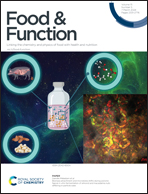Limonin alleviates high-fat diet-induced dyslipidemia by regulating the intestinal barrier via the microbiota-related ILC3–IL22–IL22R pathway†
Abstract
High-fat diet (HFD)-induced dyslipidemia is frequently accompanied by gut microbiota dysbiosis and a compromised gut barrier. Enhancing the intestinal barrier function emerges as a potential therapeutic approach for dyslipidemia. The ILC3–IL22–IL22R pathway, which responds to dietary and microbial signals, has not only attracted attention for its crucial role in maintaining the intestinal barrier, but recent reports have also suggested its potential in regulating lipid metabolism. Limonin is derived from the Chinese herb Evodiae fructus, which has shown potential in ameliorating dysbiosis of serum lipids. However, its underlying mechanisms remain elusive. Consequently, targeting the ILC3–IL22–IL22R pathway to enhance intestinal barrier function holds promise as a therapeutic approach for dyslipidemia. In this study, male C57BL/6 mice were subjected to a 16-week HFD to induce dyslipidemia and concurrently administered oral limonin. We discovered that limonin supplementation dramatically reduced serum lipid profiles in HFD-fed mice, significantly curbing HFD-induced weight gain and epididymal fat accumulation. Ileal histopathological evaluation indicated limonin's ameliorative effects on HFD-induced intestinal barrier impairment. Limonin also moderated the intestinal microbiota dysbiosis, which is characterized by the elevation of Firmicutes in HFD mice, and notably amplified the abundance of probiotic Lactobacillus. In addition, supported by flow cytometry and other analyses, we observed that limonin upregulated the ILC3–IL22–IL22R pathway, enhancing phosphorylated STAT3 (pSTAT3) in intestinal epithelial cells (IECs), thereby reducing lipid transporter expression. In conclusion, our study revealed that limonin exerted a promising preventive effect against HFD-induced dyslipidemia by the mitigation of the intestinal barrier function and intestinal microbiota, and its mechanism was related to the upregulation of the ILC3–IL22–IL22R pathway.



 Please wait while we load your content...
Please wait while we load your content...